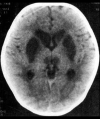Short Bowel Syndrome in an Extremely Low Birth Weight Premature Infant with Wernicke Encephalopathy: A Case Report
- PMID: 33001867
- PMCID: PMC7533949
- DOI: 10.12659/AJCR.924830
Short Bowel Syndrome in an Extremely Low Birth Weight Premature Infant with Wernicke Encephalopathy: A Case Report
Abstract
BACKGROUND Short bowel syndrome in infants is relatively rare. It consists of malabsorption caused by a congenital short bowel or extensive resection of a large part of the small intestine. The postoperative mortality rate is high and surviving patients develop many complications. Wernicke encephalopathy is caused by vitamin B1 (thiamin) deficiency. Delayed treatment may lead to irreversible neuron necrosis, gliosis, severe amnesia, Korsakoff psychosis, or even death. CASE REPORT We report the case of a premature infant with extremely low birth weight and short bowel syndrome. He was treated with early enteral nutrition combined with succus entericus reinfusion with no complications. Four months after discharge, he was diagnosed with Wernicke encephalopathy. He was treated with intravenous vitamin B1 (100 mg IV/d) and was administered oral vitamin B1 (20 mg 3 times daily) by his wet nurse. Vitamin B1 levels returned to normal after 4 days (69.8 nmol/L). Physical development was normal at the follow-up at a corrected age of 2 years. CONCLUSIONS Preventive measures for Wernicke encephalopathy should be implemented in patients with long-term malnutrition or absorption disorders. The risk of vitamin B1 deficiency increases in patients receiving parenteral nutrition and medical staff should be aware of the importance of the vitamin B1 status.
Conflict of interest statement
None.
Figures
References
-
- Duro D, Kamin D, Duggan C. Overview of pediatric short bowel syndrome. J Pediatr Gastroenterol Nutr. 2008;47(1):S33–36. - PubMed
-
- Galvin R, Bråthen G, Ivashynka A, et al. EFNS guidelines for diagnosis, therapy and prevention of Wernicke encephalopathy. Eur J Neurol. 2010;17(12):1408–18. - PubMed
-
- Rege AS, Sudan DL. Autologous gastrointestinal reconstruction: Review of the optimal nontransplant surgical options for adults and children with short bowel syndrome. Nutr Clin Pract. 2013;28(1):65–74. - PubMed
Publication types
MeSH terms
LinkOut - more resources
Full Text Sources



